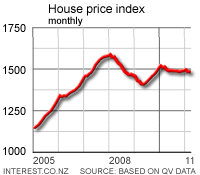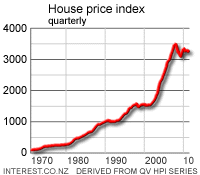 The annualised fall in house prices accelerated in January to 8.3% from 7.4% the previous month, according to government-owned valuer Quoteable Value.
Prices in Hamilton have been hardest hit of the largest cities, with prices down 10% from a year ago. Auckland City prices were down 8.4%, while Manukau prices fell 9.2% and North Shore prices fell 9.8%.
Wellington prices fell 8.1%, Christchurch prices fell 8.8% and Dunedin prices fell 8.3%. Kaipara was the region with the biggest price fall at 16.3%, while Southland prices rose 4.6%, Buller prices rose 5.8% and Westland prices rose 8%. They were the only 3 areas in the country with price increases.
Unlike figures from the Real Estate Institute of New Zealand (REINZ), which are a simple median price of houses sold in any one month, the QV figures are a rolling 3 month figure comparing the prices of houses in the three months to January with the value of those same or similar houses in the same period a year earlier.
That means the QV figures tend to be somewhat lagged because the rolling three month measure dampens down the impact of movements in the last month, but they are comparing apples with apples. The REINZ numbers can be subject to 'composition skew', whereby the houses sold in any one month could include bigger, more expensive houses in wealthier areas than those in previous months. The last REINZ figures for December showed the median price nationally down 6.6% from the peak in November 2007.
"The signs of a slight recovery in property values we saw at the end of 2008 have not continued into 2009, with the market dipping further. The number of properties selling remains at low levels which is also typical of activity around the holiday period" said QV Valuations spokesman Blue Hancock.
The annualised fall in house prices accelerated in January to 8.3% from 7.4% the previous month, according to government-owned valuer Quoteable Value.
Prices in Hamilton have been hardest hit of the largest cities, with prices down 10% from a year ago. Auckland City prices were down 8.4%, while Manukau prices fell 9.2% and North Shore prices fell 9.8%.
Wellington prices fell 8.1%, Christchurch prices fell 8.8% and Dunedin prices fell 8.3%. Kaipara was the region with the biggest price fall at 16.3%, while Southland prices rose 4.6%, Buller prices rose 5.8% and Westland prices rose 8%. They were the only 3 areas in the country with price increases.
Unlike figures from the Real Estate Institute of New Zealand (REINZ), which are a simple median price of houses sold in any one month, the QV figures are a rolling 3 month figure comparing the prices of houses in the three months to January with the value of those same or similar houses in the same period a year earlier.
That means the QV figures tend to be somewhat lagged because the rolling three month measure dampens down the impact of movements in the last month, but they are comparing apples with apples. The REINZ numbers can be subject to 'composition skew', whereby the houses sold in any one month could include bigger, more expensive houses in wealthier areas than those in previous months. The last REINZ figures for December showed the median price nationally down 6.6% from the peak in November 2007.
"The signs of a slight recovery in property values we saw at the end of 2008 have not continued into 2009, with the market dipping further. The number of properties selling remains at low levels which is also typical of activity around the holiday period" said QV Valuations spokesman Blue Hancock.
 "Declining interest rates would normally stimulate buyer activity, but concerns over job security, and a more cautious approach to lending by financial institutions seems to be preventing this. Many buyers also appear to be holding back in expectation of further property value and interest rates drops throughout 2009" said Hancock.
"Home affordability has definitely improved and there are good opportunities in the current market for those who can afford it, with motivated vendors and decreasing interest rates. We are also seeing more investors returning to the market, seeing better returns from cash flow in the current property market than returns from other forms of investment," he said.
What I think
House prices are clearly still falling and, if anything, the drop is steepening. I forecast in March last year that prices would fall around 30% from their November 2007 peaks within two to three years and would not recover to those peak levels until 2018. I refined that forecast later in the year for the median REINZ price being down 30% by the end of 2009.
My argument then was that housing was very overvalued as measured by housing affordability. If interest rates and house prices remained at their March levels, we estimated it would take until 2032 for wages to catch up to house prices, assuming a 40% threshold for the maximum mortgage servicing costs as a percentage of a single median income. One of our underlying assumptions was that interest rates were unlikely to fall much.
I was wrong on one thing, although I did mention it as one of the caveats in my forecast. Interest rates for 1-2 year mortgages have fallen much faster than I expected as the global economy has slumped into a fast and deep recession.
But I'm sticking with that forecast for a 30% fall in the REINZ median house price over the two to three year period (I may well lose my various bets about the REINZ median hitting NZ$246,400 by December 2009, but it'll happen in 2010). I had an inkling that the Credit Crunch would be worse than many expected and that we were on the cusp of an historic period of financial turmoil. I had no idea how bad it would be. I also had little real idea of the power of deleveraging and how that might affect New Zealand.
It's clear now that low interest rates aren't making much difference. The real issue now is not price of credit, it is availability of credit. Banks have imposed more stringent lending criteria and are 'deleveraging' their lending by insisting on 20% deposits rather than 5% deposits. This will get worse in the months ahead.
We are also seeing the growth of unemployment dampening demand for housing, even though affordability has improved dramatically.
I also believe longer term interest rates (2-5 year fixed rate mortgages) are unlikely to stay low for long given the huge supply of government bonds about to hit the market as governments embark on massive deficit-funded spending.
So we're sticking with our 30% fall forecast by 2010 or 2011 at the latest.
Your view? Comments below please
"Declining interest rates would normally stimulate buyer activity, but concerns over job security, and a more cautious approach to lending by financial institutions seems to be preventing this. Many buyers also appear to be holding back in expectation of further property value and interest rates drops throughout 2009" said Hancock.
"Home affordability has definitely improved and there are good opportunities in the current market for those who can afford it, with motivated vendors and decreasing interest rates. We are also seeing more investors returning to the market, seeing better returns from cash flow in the current property market than returns from other forms of investment," he said.
What I think
House prices are clearly still falling and, if anything, the drop is steepening. I forecast in March last year that prices would fall around 30% from their November 2007 peaks within two to three years and would not recover to those peak levels until 2018. I refined that forecast later in the year for the median REINZ price being down 30% by the end of 2009.
My argument then was that housing was very overvalued as measured by housing affordability. If interest rates and house prices remained at their March levels, we estimated it would take until 2032 for wages to catch up to house prices, assuming a 40% threshold for the maximum mortgage servicing costs as a percentage of a single median income. One of our underlying assumptions was that interest rates were unlikely to fall much.
I was wrong on one thing, although I did mention it as one of the caveats in my forecast. Interest rates for 1-2 year mortgages have fallen much faster than I expected as the global economy has slumped into a fast and deep recession.
But I'm sticking with that forecast for a 30% fall in the REINZ median house price over the two to three year period (I may well lose my various bets about the REINZ median hitting NZ$246,400 by December 2009, but it'll happen in 2010). I had an inkling that the Credit Crunch would be worse than many expected and that we were on the cusp of an historic period of financial turmoil. I had no idea how bad it would be. I also had little real idea of the power of deleveraging and how that might affect New Zealand.
It's clear now that low interest rates aren't making much difference. The real issue now is not price of credit, it is availability of credit. Banks have imposed more stringent lending criteria and are 'deleveraging' their lending by insisting on 20% deposits rather than 5% deposits. This will get worse in the months ahead.
We are also seeing the growth of unemployment dampening demand for housing, even though affordability has improved dramatically.
I also believe longer term interest rates (2-5 year fixed rate mortgages) are unlikely to stay low for long given the huge supply of government bonds about to hit the market as governments embark on massive deficit-funded spending.
So we're sticking with our 30% fall forecast by 2010 or 2011 at the latest.
Your view? Comments below please
House price fall accelerates in January, QV data shows
House price fall accelerates in January, QV data shows
9th Feb 09, 10:50am
by

We welcome your comments below. If you are not already registered, please register to comment
Remember we welcome robust, respectful and insightful debate. We don't welcome abusive or defamatory comments and will de-register those repeatedly making such comments. Our current comment policy is here.